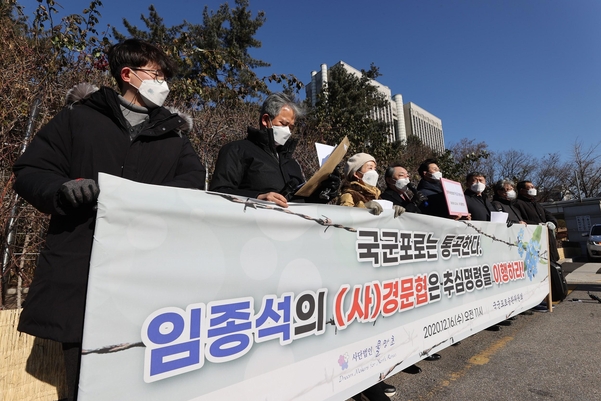On April 12th, a South Korean court dismissed an appeal by the Foundation of Inter-Korea Cooperation that argued it should not pay two octogenarian former prisoners-of-war (POWs) who escaped from North Korean captivity. This recent court ruling was announced by Dream Makers for North Korea, a South Korean civic group working on North Korean human rights issues that helped the POWs with their lawsuits.
Since 2005, the Foundation of Inter-Korea Cooperation has collected royalties from South Korean companies using copyrighted North Korean materials. The foundation, which collects the royalties on behalf of North Korean state television service KCTV, is managed by Lim Jong-seok, the former chief of staff to South Korean President Moon Jae-in.
The two former POWs, Han Jae-bok and Nah Sa-hong, had sued the North Korean government and its dictator, Kim Jong-un and were awarded 21 million won ($18,834) each for labor they performed in captivity. The two POWs escaped North Korea between 2000 and 2001, nearly a half-century after their capture during the Korean War. Pyongyang officially repatriated only 8,726 South Korean POWs.
This was the first court ruling acknowledging that a South Korean court has jurisdiction over North Korea and Kim Jong-un. Judge Kim Young-ah of the Seoul Central District Court ruled that North Korea was not a country according to the South Korean Constitution, which states that all of the Korean peninsula is South Korean territory. The court ruled that sovereign immunity did not apply, and that North Korea’s actions were subject to South Korean jurisprudence.
In its initial ruling on Han and Noh’s lawsuit, the South Korean court seized 192 million won from the Foundation of Inter-Korea Cooperation, which was equivalent to a year’s worth of royalties that the foundation collected on behalf of North Korea. The court ordered that the damages it awarded the two former POWs should be taken from that amount. “The foundation should not pay the amount of money to Chairman Kim Jong-un,” the court said.
However, the foundation appealed the court’s initial ruling. It argued that the royalties were destined for KCTV, not the North Korean government. Conservatives mocked the foundation’s explanation, saying: “do you really think that KCTV can claim copyrights in a dictatorship such as North Korea?”
The court’s April 12th ruling dismissed the foundation’s appeal.
In a separate case, in March this year, the daughter of a South Korean man abducted by North Korean soldiers during the Korean War won a civil suit against the North Korean government and its dictator Kim Jong-un.
Judge Kim Yeong-soo, who presided over the trial at the Seoul Central District Court, ruled that the plaintiff surnamed Choi was entitled to 50 million won in compensation from the North and the Kim regime. Mr. Choi was a police official who was abducted from Hapcheon, South Gyeongsang in the fall of 1950 by North Korean soldiers.
“Beginning from October 1, 1950, when Mr. Choi went missing, to January 27, 2021, an annual interest rate of 5 percent applies, and the 12 percent rate will apply after that,” the court said. This means that the court ruled that the North had to pay Mr. Choi more than 200 million won in compensation for his past 70 years of suffering. However, the court did not specify how it calculated the compensation figure exactly.
Kim Tae-hoon, president of the Seoul-based group Lawyers for the Human Rights and Unification of Korea, helped bring lawsuits by Mr. Choi and other POWs and abductees. “The North Korean soldiers’ actions amount to crimes against humanity and war crimes under the Rome Statute of the International Criminal Court,” Kim said. “It also violates the South Korean constitution and civil and criminal laws.”
The Foundation of Inter-Korea Cooperation is a nonprofit organization that was established in 2004 to facilitate inter-Korean exchanges. In 2005, the foundation signed a contract with the North Korean cabinet dealing with copyright issues and collected royalties from South Korean media using North Korean publications and video materials.
Major South Korean broadcasting companies, including KBS, have paid about 30 million won in royalties to the foundation. The foundation received nearly 790 million won from 2005 to 2007, and sent it to North Korea in U.S. dollars after receiving approval from the South Korean Ministry of Unification.
The foundation has been barred from transferring money to North Korea since 2008 after Seoul imposed a new set of sanctions after a North Korean soldier shot and killed a 53-year-old tourist at the Mount Kumgang resort. From May 2009 to the end of last year, the foundation deposited about 2.09 billion won under court administration.
This was not the first time that the Foundation of Inter-Korea Cooperation faced controversy. Many conservatives showed their discomfort with major South Korean broadcasting companies airing major North Korean events such as Kim Jong-un’s New Year speech and their annual military parade live while paying the North for its “copyrighted” contents.
The United Nations Human Rights Council adopted a resolution in March condemning human rights violations in North Korea. However, the South Korean government declined to co-sponsor the resolution for the third year in a row. For the first time, the resolution also mentioned continued rights violations affecting unrepatriated prisoners of war and their descendants.
In 2013, the United Nations’ Commission of Inquiry on Human Rights in the Democratic People’s Republic of Korea concluded as follows.
“Only 8,343 POWs were returned to the ROK in the immediate aftermath of the armistice between April 1953 and January 1954. On the basis of the discrepancy between this figure and in the numbers reported by Kim Il-sung and Peng Denhuai to Stalin, the Commission finds that at least 50,000 POWs from the ROK were not repatriated. It is estimated that approximately 500 survivors are still being held in the DPRK.”
President Moon Jae-in, for his part, failed to raise the POW issue to Kim Jong-un during their three summits in recent years.


